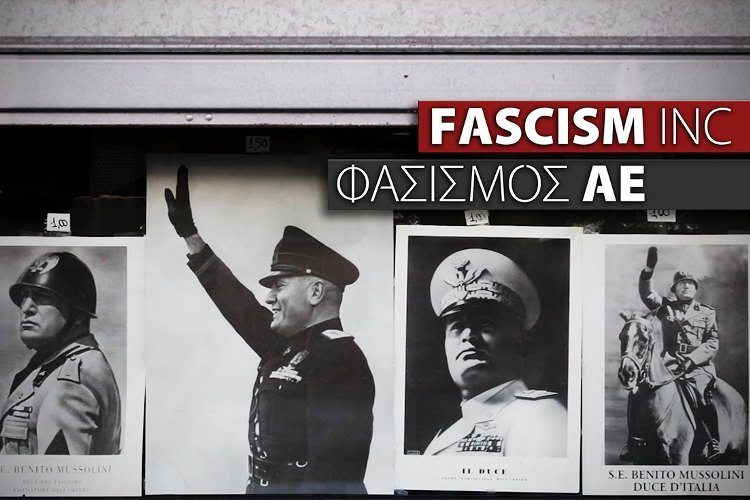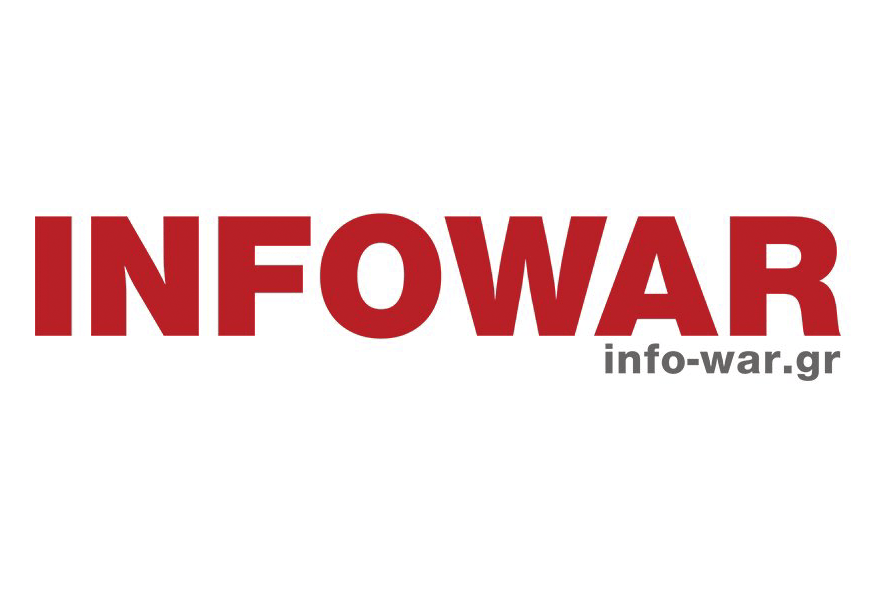Interview with Aris Chatzistefanou by Antonis Galanopoulos for analyzegreece.gr
Translated by Thomi Gaki
The creators of Debtocracy and Catastroika return with a new documentary, Fascism Inc. The documentary Fascism Inc. aspires to be inspired and to inspire the anti-fascist movements across Europe, while continuing one of the largest independent journalism experiments.
We discuss with reporter and director Aris Chatzistefanou about the present and future of fascism and its connection with the various economic interests through time. The 17th Thessaloniki Documentary Festival – Images of the 21st Century will be held from March 13 until March 22. In the Greek Panorama segment of the festical is included the documentary Fascism Inc. directed my Aris Chatzistefanou. The documentary will be screened on Sunday, March 15 and on Tuesday, March 17. More infos here
After your two successful documentaries Debtocracy and Catastroika on debt and privatizations, now comes Fascism Inc. What are the reasons for this choice?
In a way it is a sequel of the two previous documentaries, in the sense that we examine the economic aspects of fascism. Throughout history, during periods of big economic crisis, the economic elites turn to fascism when their needs cannot be covered by the existing political establishment. In this documentary we study the economic aspects of fascism and that is why it is considered to be a sequel of Deptocracy ,that focuses on the way the dept crisis was created and Catastroika, that focuses on the way that crisis threatens democracy, mostly when the state is completely destroyed and public property is being divested.
The question of course is if things are exactly the same like in the 20s’ or the 30s’ when the economic elite decided to bring fascism to power. On one hand I do not believe that we are in that place but on the other hand something important has happened: the solution of fascism is considered viable and the case of Ukraine proves that. If they have to, the economic elite can even talk with Nazis or fascists in order to secure their interests. EU is playing a very specific role in the way it puts up with neo-fascist formations in coalition governments. I am talking about really old cases like the Fini case in Italy or nowadays with everything that is happening in Holland and Austria. The same also happens in Ukraine and certainly in Greece, where the economic elite paved the way by imposing a big coalition government with LAOS in Loukas Papadimos government (November 2011-May 2012).
In which aspects of fascism does your documentary focus?
We start with the theoretic and historic context of fascism. Our narration begins with Mussolini’s fascism in Italy and Hitler’s Nazism. We move to the occupation period in the 40s’, the phenomenon of quisling, the civil war and how all these characteristics are found today in every aspect of the Greek society and the political system and how we see them surfacing during periods of crisis. We find these characteristics in the junta case and we see them again nowadays. If we want to talk in financial terms, I think that these periods are also periods of vast redistribution of wealth from the bottom to the top reminding us the so called primitive accumulation of capital that definitely took place during the occupation period, the dictatorship and we have the feeling that is also happening now. History will prove that, but I believe that this is the third time that something like that is happening.
Is the crisis necessary and sufficient condition for the development of fascism? And if so, is it enough to say that as soon as development comes or the memorandums end, fascism will also disappear? Briefly, which are, in your opinion, the main reasons for the rise of Golden Dawn in Greece?
The crisis is definitely the most important factor and it creates fertile breeding ground for the development of fascism. As I mentioned before, during periods of crisis, the economic elites are searching for answers that in the case of fascism might also have the character of a mass movement. What they are looking for is a reactive right mass movement that has the power to stop a left mass movement. One may wonder if there is indeed a left mass movement that poses a threat in such a scale that it will make them turn to fascism. It does not exist, but the circumstances for its creation do exist and that is why I am saying that they are thinking about fascism. It is not like fascism is already here or that they have decided to definitely move towards that direction.
So, according to our way of thinking, economy is the main factor. Obviously fascism is so complicated that one cannot just explain it by using economy, only. Coming back to Greece, the whole history with quisling during the occupation period, the fact that Greece is probably the only European country where those who cooperated with the Nazis were not defeated and punished like in the other countries but in fact won the civil war and were absorbed by the state apparatus, provides, politically speaking, fertile ground for the rise of such parties. However, and I am closing with this, if we take a closer look at the graph on the electoral rise of Golden Dawn, it is very interesting that the leaps that happened in its power are always related to the imposition of memorandums, starting from 2010 when Golden Dawn took its first important steps, mainly with L. Papadimos government. If we study the graphs, Golden Dawn blasts off and continues rising every time that new measures are imposed; so this correlation is rather necessary. Golden Dawn functions as the military part of a neoliberal party and we can see that if we observe all their moves while they were represented in the Parliament. The 140 questions in favour of the ship owner’s interests, their support on the sell-off of the Agricultural Bank, the support on shutting down ERT, which is also a sell-out of public frequencies to the private channels. All their moves were more violent but completely compatible to a neo liberal agenda.
Is fascism returning to Europe? What responsibility EU bears on this development?
There is definitely the return of a form of serious fascism, what some call meta-fascism; “wolves” with their features hidden, like Fini in Italy or Le Pen in France. Maybe they don’t have the swastikas and the Nazi salute but these parties have their roots on the Nazi collaborators. Fascism is on the table by European economic elites and the European institutions bear a huge responsibility for two reasons. On one hand, through the austerity policy, they created the conditions into which those parties can develop and on the other hand, they tolerated them in a political level. Under the pressure of troika, G. Karatzaferis managed to become part of the government, representing a party that in the past had shown anti-Semitic features and its members have supported the junta. For example, we have seen a video of Adonis Georgiadis (member of LAOS then, since 2012 member of New Democracy) where he is dancing and shouting slogans that were practically Nazi. LAOS was obviously not a neo-Nazi party but by including a party of the extreme right wing in the Parliament you legitimize it and you open subsequently the road even for Golden Dawn. And that is something that the EU does in every country through the large coalitions that it forwards.
Do you think that the antifascist movement in Greece has responded properly in the rise of fascist groups?
We should be proud of the way people reacted after Pavlos Fissas was murdered but we should also be ashamed by the fact that there were no reactions earlier, when the Golden Dawn was murdering immigrants. We do not understand that the immigrants are in a way the Jews of today, they are the scapegoats. It should have woken us up earlier. The antifascist movement, the way we know it in Greece and in Europe, covers a very important aspect of the fight against fascism. We should crash the fascists and maintain even geographically speaking, the public space. What do I mean by that? From what I know I can tell you that in Athens, in the area of Agios Panteleimonas, there was no access because the fascists had it under control; we shouldn’t have let that happen. In that case a strong antifascist movement of 50.000 people had to go and say “this playground belongs to all of us and everyone should have access to it”. That is an example of an anti fascist movement with today’s characteristics, but other things are also needed. Since our analysis traces mainly financial reasons for the rise of fascism, in the end what is needed is a battle against capitalism. Fascism is a phase of capitalism, not a foreign body. Thus, we must fight its main causes and there the battle is political and economical. Finally, there is also an ideological fight that we should give against fascism but there are some limits to that. And I say this because these neo-Nazi formations do not stand on a very solid ideology. There will be a point that you will manage to put pressure on them by using ideological arguments but the next day they will change their position and say something else. So an ideological battle is necessary but we need to take into account its limitations.
All three documentaries were funded by the public. The method of crowdfunding can guarantee that a creative work as a documentary production will continue? Which are the benefits and which are the dangers?
First of all I believe that it’s a miracle that we have managed to produce all three documentaries without making quality discounts. Especially with Catastroika we thought it was necessary to travel from Russia to the USA in order to study some cases and people gave us the opportunity to do so. In a period of crisis this was unexpected even for us. The cost for Fascism Inc was equally well covered. Now as we are all professional journalists or professional technicians, cameramen or editors, could we have managed to survive only with this method? The answer is no. If you compare the working hours and the opportunity cost it is as if we gave some of our own money too. Because if you consider the fact that we might only get one salary and work for seven months you understand that in a sense we lose money.
New opportunities are coming up though, and I believe that if other groups also move towards this direction, in a more organized way, this model may actually work. In general, I am not in favour of people paying for the production of information and knowledge. I believe that these activities belong to the public sphere. I am saying this because at the moment people are paying in numerous ways even for the private channels. They are paying them in order to have free sequences and recapitalize the banks that provide them with loans. Mega Channel, Antenna TV, all the channels that are spreading propaganda, are in fact paid by the people. This kind of money should be spent for another kind of information. Given the circumstances though, and considering the fact that Greece has slumped 50 places in the list for the freedom of the press of the Reporters without Borders, it is very hopeful what is happening with those three documentaries. We have the opportunity to say what we want; we can turn against corporations and not be afraid that we will lose advertising. We can turn against politicians and not be afraid that we will lose our jobs. In this sense it went really well.

